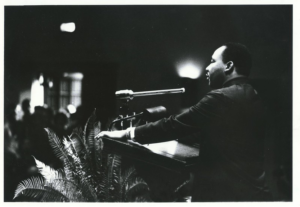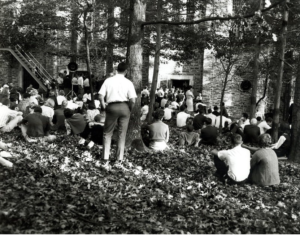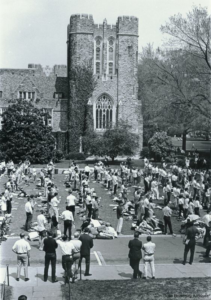Martin Luther King Jr.’s visit to Duke University

Dr. Martin Luther King Jr. speaking in Page Auditorium on November 13, 1964.
In November 1964, Martin Luther King, Jr. spoke at Duke University in Page Auditorium. His remarks captured the tenor of the civil rights protests in Durham and throughout the south. Acknowledging that lagging standards existed among Blacks in some areas, King argued that “economic deprivation and social isolation will breed crime and illiteracy in any society.” “Every person of good will,” he declared, “must be made to see that segregation must die and that it is a cancer of the body politic that must be cured.” King urged Blacks, in cooperation with the white forces of good will, to participate in a “massive action program centered on implementation of the 1964 Civil Rights Bill.” In his conclusion, King celebrated the “miracle” at the center of the civil rights movement. Quoting poet James Russell Lowell, he spoke of how faith informed his own vision:
Truth forever on the scaffold, Wrong forever on the throne,
Yet that scaffold sways the future, and, behind the dim unknown,
Standeth God within the shadow, keeping watch above his own
“With this faith,” King told the assembled crowd:
“we will be able to hew out of the mountain of despair a stone of hope; with this faith, we will be able to transform the jangling discord into a beautiful symphony of brotherhood; with this faith we will be able to speed up that day when all of God’s children all over this nation, black men and white men, Jews and gentiles, Protestants and Catholics, will be able to join hands and sing in the words of the old Negro spiritual, ‘Free at last! Free at last! Thank God Almighty, we are free at last!’”

On November 13, 1964, Dr. Martin Luther King, Jr. spoke about the progress of the Civil Rights Movement in Duke’s Page Auditorium. The crowd filled the auditorium, overflowing into the wooded area just outside the building. Note the round speakers in the background.
King received a standing ovation from the standing-room-only crowd. One white Duke student remembered being “thrilled” by his speech. “The moral depth and clarity of his thought,” another student remembered, “set the tone [for that time].”

Duke Silent Vigil, April 1968
In April 1968, King’s assassination sparked a mass demonstration for racial justice at Duke called the “Silent Vigil.” The four-day sit-in on Duke’s main quadrangle eventually attracted over 1500 students and faculty. King’s visit to campus in 1964 loomed large in the minds of many Silent Vigil participants. Jack Boger remembered King’s speech as “one of the most prominent events of our freshman year.” “Many of us who heard him,” David Henderson reflected, “knew we were in the presence of a Godly man.” Listen to excerpts from the speech here.
Ted Segal is a Duke graduate (A.B. 1977), retired lawyer, and a board member of the Center for Documentary Studies at the school. His book, POINT OF RECKONING: The Fight for Racial Justice at Duke University, will be published by Duke University Press in February 2021. Special thanks to the Duke University Archives for preserving the historical records quoted in this piece and for making them readily accessible. You can follow Ted on Twitter at @theodoresegal.
Photos courtesy of The Duke Archive.
Worth listening to. I’m so used to hearing the famous soundbites.